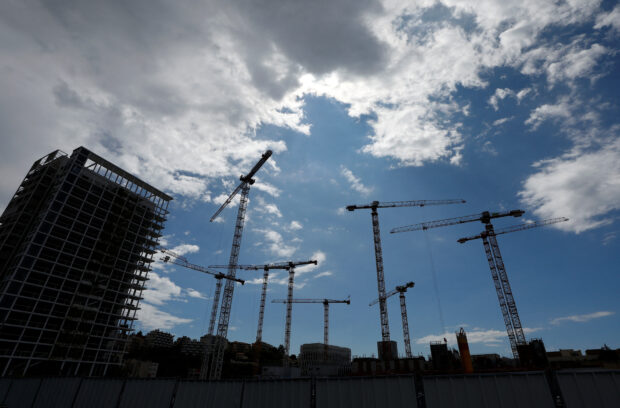French, Spanish economies grew in Q2, Germany stagnated

Cranes are seen at a construction site in Nice, France, May 11, 2023. REUTERS/Eric Gaillard/File photo
PARIS/MADRID -Some of the euro zone’s top economies displayed unexpected resilience in the second quarter even as a raft of indicators pointed to renewed weakness ahead, as manufacturing ails and services slow.
The French and Spanish economies grew at a sustained pace on the back of stronger exports and tourism, statistics agencies said on Friday, auguring a possible euro zone rebound.
The German economy, however, stagnated after the economy fell into a mild recession in winter. It was mainly household consumption which helped avoid a longer recession.
“We continue to see the German economy being stuck in the twilight zone between stagnation and recession,” said Carsten Brzeski, global head of macro at ING.
France’s gross domestic product expanded in the second quarter a faster-than-expected 0.5% from the preceding quarter, while the Spanish economy grew 0.4 percent, according to data from the French and Spanish statistics agencies.
French growth was driven by exports, boosted largely by the delivery of a cruise liner. In Spain, external demand, which includes foreign tourism, a pillar of the country’s activity, led the growth.
“We see that for the first time, French growth is driven by exports, by corporate investment much more than by household consumption,” Finance Minister Bruno Le Maire told RTL radio.
“This shows once more that our production engine is running well and efficiently.”
Despite Germany’s stagnation, the data from Spain and France bode well after the euro zone’s growth was 0% in the first quarter of this year. Bloc-wide growth figures for the second quarter are released on Monday.
French economic growth sped up from a revised 0.1 percent in the first quarter, stats agency INSEE said in its quarterly GDP report. A Reuters poll of 29 economists had an average forecast of 0.1 percent with estimates ranging from 0.3 percent to minus 0.1 percent.
Spanish GDP growth, on the contrary, decelerated slightly from a revised 0.5 percent expansion in the first quarter.
Spanish unemployment hit a 15-year low in the second quarter of this year, with a record 21 million people employed, data showed on Thursday, while 12-month inflation in Spain, at 2.3 percent, was one of the region’s lowest in July.
“The economic policy works, as the strong growth, job creation and price stability show,” Economy Minister Nadia Calvino said on the Telegram social media platform.
Austria, a much smaller economy, shrank 0.4 percent in the second quarter due to a slowdown in construction and industry.
Stagnating
Looking further ahead, there is still an uncertain economic outlook for the euro zone.
Big firms in the bloc are recording stagnating activity levels and see no improvement in the current quarter with risks tilted towards even more negative outcomes, the European Central Bank said on Friday based on a survey of large firms.
The survey adds to an already gloomy picture with a raft of indicators from PMI readings to GDP and lending data all suggesting that the bloc was performing at the weaker end of expectations with recession risks on the rise.
“Contacts continued to describe a situation consistent with broadly stagnating activity overall,” the ECB said based on a survey of 73 firms. “Current trends in activity were likely to persist in the third quarter, with the balance of risks a few quarters ahead tilted mildly to the downside.”
The ECB raised rates for the ninth successive time on Thursday but left the door open to a pause in September, partly due to weaker growth and tentative signs of a cooldown in underlying inflation.